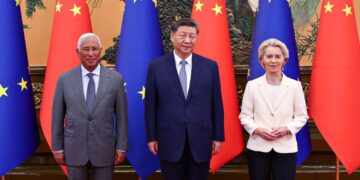Gujarat Hairdresser Detained Over Remarks on India’s Air Strikes: A Flashpoint in Free Speech Debate
In a recent incident that has sparked widespread discussion across India, a hairdresser from Gujarat was arrested after making provocative statements about India’s recent air strikes targeting Pakistan. These remarks, shared on social media platforms, were perceived by many as inflammatory and disrespectful towards the Indian military operations amid escalating tensions between the two neighboring countries. The arrest has intensified debates around the limits of free expression in a politically sensitive climate.
The case underscores the challenges faced by authorities in balancing national security concerns with citizens’ rights to voice dissenting opinions. As geopolitical strains continue to influence public sentiment, this episode highlights how expressions deemed critical or controversial can quickly become flashpoints for legal action and societal backlash.
Navigating Free Speech Laws in India: Legal Boundaries and Their Implications
India’s Constitution enshrines freedom of speech under Article 19(1)(a), yet this right is circumscribed by “reasonable restrictions” aimed at preserving sovereignty, public order, and national integrity. The Gujarat hairdresser’s arrest brings into sharp focus these legal boundaries—particularly how laws like Section 124A (sedition) and Section 153A (promoting enmity) are applied when speech is considered harmful or divisive.
Legal experts argue that such provisions often suffer from vague interpretations that risk curtailing legitimate criticism under the guise of maintaining order. For instance, sedition charges have historically been contentious due to their potential misuse against political dissenters or minority voices. This incident reignites calls for reform to ensure these laws protect democratic freedoms without compromising security.
| Legal Provision | Description |
|---|---|
| Article 19(1)(a) | Guarantees freedom of speech and expression subject to reasonable restrictions. |
| Section 124A (Sedition) | Covers acts or speech inciting disaffection against the government. |
| Section 153A | Bans promotion of hostility between different religious or social groups. |
Encouraging Thoughtful Conversations Amid Rising Polarization
The digital age amplifies voices but also magnifies divisions—this case exemplifies how online commentary can rapidly escalate into real-world consequences. In an environment where political discourse is increasingly polarized, fostering responsible communication becomes imperative for social cohesion.
Cultivating respectful dialogue involves several key practices:
- Diligent Fact-Checking: Ensuring accuracy before sharing opinions helps prevent misinformation-driven conflicts.
- Cultivating Empathy: Appreciating differing viewpoints—even those we disagree with—can reduce hostility and promote understanding.
- Civil Engagement: Avoiding incendiary language encourages more productive exchanges rather than deepening divides.
- Pursuing Active Listening: Valuing diverse perspectives fosters inclusivity within discussions on sensitive topics like national security or foreign policy.
This approach not only mitigates tensions but also strengthens democratic participation by enabling informed debate rather than reactionary responses fueled by emotion alone. Recent surveys indicate that over 60% of Indians believe respectful dialogue is essential for resolving contentious issues—a statistic highlighting growing public appetite for constructive engagement despite ideological differences.[1]
Striking a Balance Between National Security Concerns and Democratic Freedoms
The Gujarat hairdresser’s detention serves as a microcosm reflecting broader societal struggles: How does one safeguard patriotic sentiment without stifling legitimate critique? In democracies worldwide—from France grappling with hate speech laws to South Korea managing online defamation—the tension between protecting state interests and upholding civil liberties remains complex.[2]
This event invites policymakers, civil society actors, and citizens alike to reconsider frameworks governing free expression during times of heightened geopolitical conflict. Transparent guidelines clarifying what constitutes unacceptable speech versus protected opinion could help prevent arbitrary enforcement while respecting pluralism within Indian society—a nation home to over 1.4 billion people representing myriad cultures and beliefs.[3]
Conclusion: Reflecting on Freedom of Expression Amidst Political Sensitivities
The arrest related to comments on India’s air strikes against Pakistan spotlights enduring dilemmas at the intersection of patriotism, law enforcement, and individual rights in contemporary India. As authorities tread carefully through this charged landscape, it remains crucial that democratic principles are preserved alongside efforts ensuring national unity during turbulent times.
The unfolding developments will be closely watched both domestically and internationally as indicators of how India navigates its commitment to free expression while addressing security imperatives in an era marked by rapid information exchange—and sometimes volatile reactions—to political events.
(Sources cited below)















